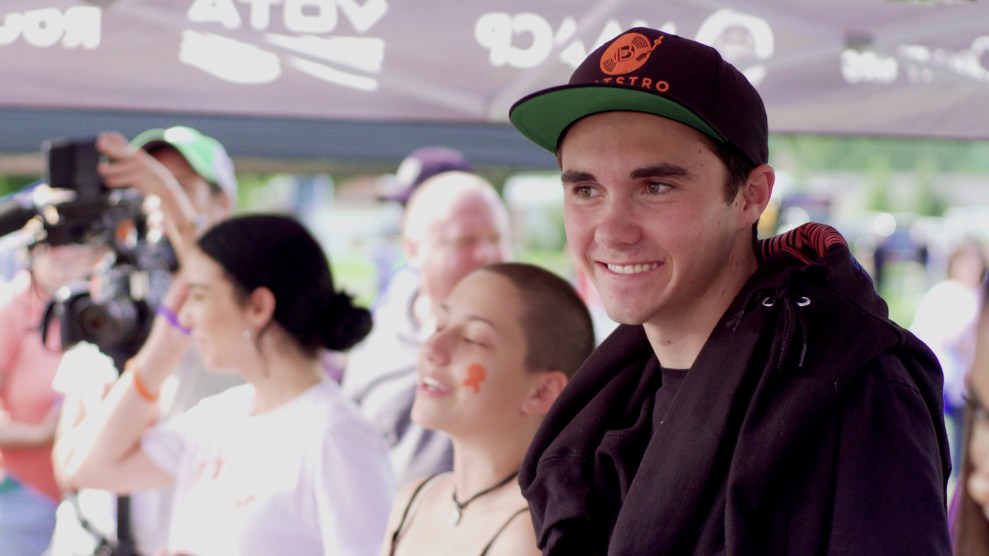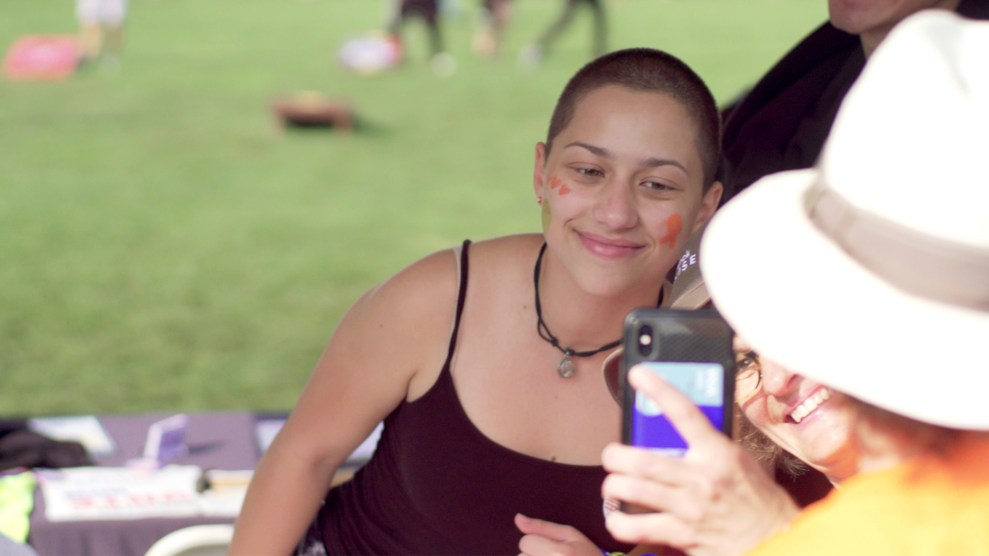One week after the mass shooting at Marjory Stoneman Douglas High School in Parkland, Florida, in February, student survivors outraged with Washington’s “thoughts and prayers” took to CNN to declare politicians as complicit in the deaths of their classmates. Just one month later, those same students organized nationwide “March For Our Lives” rallies, vowing to purge the political class of National Rifle Association-backed lawmakers.
Now, six months after a shooting that left 17 people dead (it feels “more like 60 years” #NeverAgain co-founder David Hogg told Mother Jones), the Parkland teens are throwing everything they’ve got at the midterm elections. On Sunday, the young activists reached the end of their “Road to Change” bus tour, which took Parkland survivors and activists from communities stricken by daily gun violence to 33 cities and towns across America.
Zeroing in on communities with historically low youth turnout, the students registered new voters, held town halls, and connected with local leaders who support their goal of curbing gun violence by, among other things, limiting unfettered access to assault weapons and requiring background checks for all gun sales. Their journey concluded in Newtown, Connecticut, a community still mourning its own school shooting nearly six years ago. As the activists’ cross-country trek drew to a close, Mother Jones traveled to Newtown for the tour’s final stop and also hosted student leaders in New York City. We wanted to find out what they had learned during a summer of activism, and how they planned to maintain momentum through November.

#NeverAgain co-founder David Hogg hands out T-shirts at the final stop of the “Road to Change” national bus tour in Newtown, Connecticut, on Sunday.
Mark Helenowski/Mother Jones
The “Road to Change” bus moved at a punishing pace, covering 25 states in 60 days. “We’ve spoken in more congressional districts than almost any presidential campaign has in the same time span,” Hogg told Mother Jones. “We know what America’s thinking right now.”
Hogg is convinced that voters are on the students’ side. He pointed out that the vast majority of Americans favor expanded background checks for gun sales, a cornerstone of the “March For Our Lives” platform. Young people are especially enthusiastic about their message, said Bria Smith, a violence prevention advocate from Milwaukee who joined the tour when it stopped through her hometown. “They’re craving to be able to reform policies, craving to be able to organize and mobilize in their communities—and we noticed they just needed the push and the movement and the inspiration,” she said during a joint interview with Hogg.
That craving was apparent in Newtown, where hundreds of students, many of whom grew up in the shadow of their own tragedy, gathered under threatening storm clouds to greet the activists as they rolled into town. Prominent in the crowd were members of the Junior Newtown Action Alliance, young people who banded together after the 2012 Sandy Hook Elementary School shooting to push gun safety measures, and who now looked forward to forging relationships with the Parkland students.
“It’s all about making civic engagement cool,” 17-year-old “March For Our Lives” co-founder Jaclyn Corin explained during a roundtable discussion hosted by Mother Jones. “They see people that are the same age as them getting up there and actually doing amazing things around the country and say, ‘Oh, these kids are my age and are getting out there and doing all this amazing work, so why can’t I?’”

Parkland student leader Emma González poses for a selfie at the “Road to Change” rally in Newtown, Connecticut, on Sunday.
Mark Helenowski/Mother Jones
The scourge of gun violence hit home for Hogg as he crisscrossed the country, with stops in places like East Oakland, South Central Los Angeles, and Ferguson, Missouri, where he spent Father’s Day with the father of Michael Brown, a black teenager killed by a police officer in 2014. “The thing I learned most on this tour is how blatantly racist society is,” he says. “Mass shootings that primarily affect affluent white people get a lot more coverage than everyday shootings, especially [shootings] in black and brown communities. And that’s incredibly disturbing.”
Fighting alongside Parkland students, young leaders from communities afflicted by daily violence say they now feel emboldened: “Growing up, I was so conditioned and normalized by the brutality and the violence in my community,” Smith said. “I’d never felt like I had a platform to speak on injustices and be able to uplift my voices of brown and black youth back in my home.”
“In the past, I usually was quiet because every time I talked, I was told not to,” said Alex King, a student activist from Chicago. “Being a part of this tour, it built me up a lot.”
Now that the tour has wrapped, the students are looking ahead and trying to capture momentum. They haven’t yet hashed out a detailed plan, but Corin says the group will relentlessly recruit young people to vote in November. They’re also asking supporters to study gun laws and to volunteer for candidates who favor reasonable limits on the Second Amendment.
“We know that we can win, but the only way that we can win is if those people that actually say they want change go out and advocate,” Hogg says. “The only way that the people will get this change is by voting on November 6.”
Check back with Mother Jones throughout the week for more highlights from the final stop of the “Road to Change” tour, including an exclusive roundtable discussion with “March For Our Lives” leaders on a special edition of the Mother Jones Podcast, available Wednesday, August 15.


















